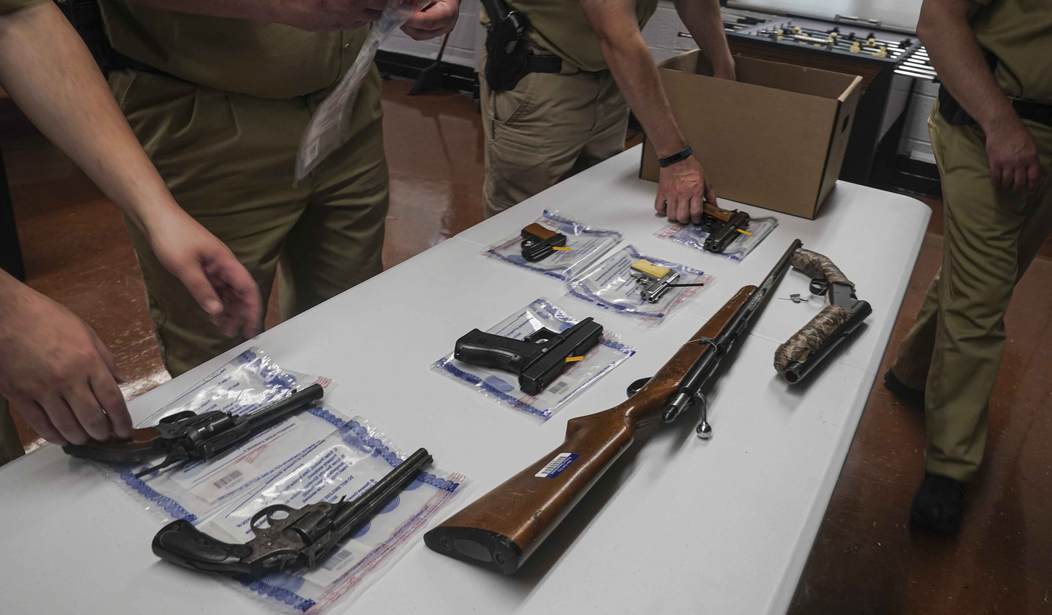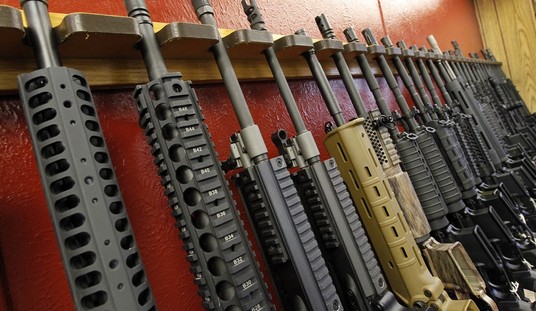There’s no evidence that these gun “buyback” programs actually reduce violent crime, suicides, or accidents involving firearms, but that’s no impediment to the anti-gun politicians who want to be able to say they’re “doing something”. How often have we heard a mayor or police chief say that “taking guns off the street” is an important and valuable tool, even if they can’t actually document a reduction in violent crime after a compensated confiscation event is held?
Well, in Houston they’re apparently willing to let some guns stay on the street rather than offer gift cards in exchange. A new “buyback” initiative announced by city officials on Monday has a rule that wasn’t in place the last time around: no “ghost guns” or homebuilt firearms.
Why is that, exactly? I mean, haven’t we been hearing gun control activists proclaim that “ghost guns” are a scourge on society that must be eradicated? If that’s the case, then why is the city of Houston not interested in taking those particular guns out of the hands of owners who are willing to part with them? Houston Mayor Sylvester Turner says the decision to not accept so-called ghost guns was made after one individual at the last event turned a healthy profit after turning in a number of home-built guns that he’d constructed for just a few dollars each.
“We did get some ghost guns where people may have 3D-printed or made these guns specifically for the gun buyback program,” Turner said to ABC 13. Turner told ABC 13 that officials will not accept 3D-printed “ghost guns” at the next buyback to avoid shelling out payments to alleged scammers of the program in the future.
The Houston man who sold the box of ghost guns back to the city during July’s event told Fox 26 that “the goal was not personal profit, but to send [Houston leaders] a message about spending $1 million tax dollars on something that has no evidence of any effect on crime.”
Harris County and city officials labeled the July buyback event a success after handing out $100,000 in cash gift cards in exchange for 845 guns, at least 50 of which were ghost guns. The buybacks, part of Turner’s sweeping anti-crime initiative One Safe Houston, have faced criticism from Harris County District Attorney Kim Ogg, who told ABC 13 that the no-questions-asked component of the events should be revisited in case any of the guns can help law enforcement investigate crimes.
Harris County Commissioner Rodney Ellis, one of several local leaders who signed on to the events as official partners, told ABC 13 that “gun buybacks that are successful are ones that are part of a larger package… If we got one gun, just one, that could have killed somebody. If that person was me, you, or one of your listeners, it was well worth it.”
If that’s the philosophy behind the gun “buybacks,” then what’s the issue with accepting home-built guns? Aren’t they just as likely as a gun that’s been stored in someone’s attic for the past two decades to be used in a crime or a suicide?
I think the real issue that Mayor Turner and other officials had with the gentleman who turned over a box of “ghost guns” is that he helped demonstrate the frivolous nature of the gun turn-in event. Turner made a big deal before and after the first “buyback” was held about removing “unwanted” guns from the city, and even appeared on national television to tout its success, but the compensated confiscation event was also getting pushback from local law enforcement.
“If we took one gun off the street that could have been used in seriously injuring or killing someone, then the program was worth it,” Turner said on Good Morning America.
Douglas Griffith, the president of the Houston Police Union, believes it is a waste of money and could be better spent at a time when the police force is running at its thinnest level in years.
“Our biggest problem now is recruiting and trying to get guys to come here and be policemen,” Griffith said. “Our starting salary as a police officer is $42,000 for your first year so we could use that money for hiring bonuses. Whatever we have to do. That’s the only way to stop crime.”
Griffith’s criticism was and is well-founded, and I’m sure it stung even more after the hobbyist in Houston handed over his box of home-built handguns as part of the “no questions asked” gun turn-in. After all, while the mayor is out there talking about getting rid of guns, here’s a guy who’s making them solely as a response to the city’s so-called buyback.
Houston’s gun turn-in event also sparked criticism from local prosecutors, who argued that not identifying those handing over firearms could hinder prosecutions or police investigations.
David Mitcham, the top assistant to DA Kim Ogg, said Monday his office takes issue with the no-questions-asked part of Saturday’s event at Wheeler Avenue Baptist Church in the Third Ward, where Houston-area residents were invited to anonymously turn in handguns and rifles in exchange for gift cards worth at least $50.
In the event any of the turned-in guns are determined to have been used to commit a crime, Mitcham said connecting that weapon to a person responsible would be akin to encountering a “brick wall or blind alley.”
“We certainly recognize the importance of getting guns off our streets … in an effort to reduce violent crime. We applaud that sentiment,” Mitcham said. “But it frankly is mystifying as to why you wouldn’t identify who it is that was turning in the gun.”
The DA’s office also said it wasn’t consulted before the gun buyback event, according to Mitcham, who confirmed that Ogg expressed her concerns in a Thursday letter written to Harris County Sheriff Ed Gonzalez, Precinct 2 Constable May Walker and Houston Police Chief Troy Finner, whose department co-hosted Saturday’s event and is processing the weapons that were collected.
Mitcham added that the distribution of gift cards could be problematic in the event a gun is tied to a crime. The person who turned in the firearm may be considered a witness to the crime, and accepting something of monetary value from law enforcement in return could cause problems for prosecutors down the line.
“We’re required under law to give notice to the defendant in a criminal case of any witness receiving anything of value from the state,” Mitcham said. “This hampers our ability to be able to comply with that aspect of the law, because the person that’s tendering the firearm is unidentified.”
I’d say the odds of a gun that was previously used in a crime getting turned over to police at a “buyback” are pretty low, but that doesn’t mean it’s non-existent.
Despite the complaints from rank-and-file officers, prosecutors, and the public, I’m sure that Turner will still declare the upcoming compensated confiscation event a success no matter how many rusted and worn out garbage guns are handed over. Thanks to the efforts of that hometown gun maker, however, and the criticism of police officials like Griffith, media outlets that would have in the past simply lavished praise on Turner for his public safety efforts are now at least a little more likely to question the official narrative around these events; a welcome development given the historically high levels of violent crime and homicides the city is currently experiencing. Houston shouldn’t be giving money to guys turning over “ghost guns,” because they shouldn’t be hosting these idiotic and worthless gun “buybacks” to begin with. But with Houston’s police chief describing a “fractured criminal justice system” that’s failing to hold violent criminals to account, it’s no wonder that politicians like Sylvester Turner would rather distract the public and promote his anti-gun agenda instead of addressing the real issue.








